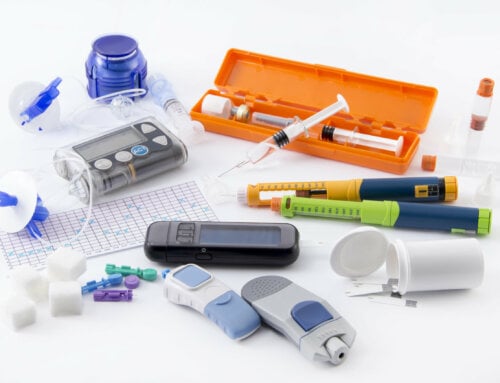Often women with diabetes have fluctuating hormone levels that may cause other health issues, especially during menstruation and menopause. Hormonal imbalances have been linked to health conditions associated with diabetes, such as heart disease and kidney problems. Discover more about hormone therapy in women who have diabetes and how it may help.
- Irregular hormone levels can cause painful menstrual cycles and an array of uncomfortable symptoms during menopause. Recent research reveals women with diabetes often have low levels of the “female” hormone called estrogen, which may be linked to kidney problems and heart disease. Additional research has shown the “male” hormone called testosterone, can help reduce cholesterol and improve glucose control. Balancing your hormone levels can boost your overall well-being and ward off health conditions associated with diabetes. Discuss hormone replacement therapy with your doctor and whether it would be beneficial for you.
- Women with diabetes often have too little estrogen and too much testosterone. Many women with diabetes reach menopause before women who do not have the disease. Supplementing women with estrogen when they have low estrogen levels can reduce the incidence of diabetes-related complications. A study at Kaiser showed a 16% overall reduction rate of complications in women taking hormones. Those taking estrogen had a 12% reduction while women taking estrogen and progesterone had a 25% reduction rate. Hormone therapy is generally prescribed immediately after menopause is diagnosed and used no longer than 5 years. Many physicians may stop hormones even before the 5 year period depending on your overall health history.
- Stress can lead to hormone fluctuations and related conditions such as high blood pressure and heart disease. Managing diabetes can become stressful and it is important to be positive and proactive. Use a blood pressure cuff at home to monitor your blood pressure and report elevations to your doctor. Chronic stress may lead to premature aging, heart problems and can inhibit testosterone function. Lack of testosterone can make it harder to build muscle and may cause fatigue. Eat well-balanced meals with snacks to avoid blood sugar fluctuations. Stay away from sugary snacks and fatty foods. Eat whole grains, reduced fat dairy, vegetables and fruits and lean meat, poultry and fish. Exercise daily for about a half hour to regulate blood sugars and reduce stress. Consider meditation, biofeedback and deep breathing for stress reduction. Go to a yoga or Tai-Chi class to help minimize stress and give you a healthy energy boost. Try resistance training to build muscle and aerobics such as biking, elliptical machine and walking for improved cardiovascular health.
- During your menstrual cycle, fluctuations in hormone levels frequently occur. Reduced estrogen levels can make your body resistant to insulin. As a result, your blood sugar can soar up to 5 days before and after your period. Test your blood sugar regularly and report the results to your doctor to determine your usual patterns. Ask about adjusting your insulin doses and carbohydrate intake during this time to get better control of your blood sugar. When progesterone levels rise during your period, food cravings can be triggered, especially for sweet treats. Try sugar-free and fat-free versions to help ward off cravings.
- Women with diabetes are more prone to polycystic ovarian syndrome, which is part of the insulin resistance syndrome. Women with PCOS produce higher levels of male hormones including androgens and testosterone. PCOS is generally caused by genetics and certain lifestyle factors. Symptoms may include irregular menstrual cycles, obesity, acne, ovarian cysts, hair growth on your face and infertility. It can help when your doctor prescribes Metformin and hormones along with life style changes. Try to eat healthy, exercise regularly and lose weight. Low-estrogen birth controls pills can reduce symptoms of PCOS as well.
- During menopause, the doctor may recommend hormone replacement therapy (HRT). It can help protect you from heart disease and reduce blood sugar highs and lows. HRT may not be recommended for women with diabetes who have other health conditions such as high blood pressure, uterine fibroids, endometriosis, sickle cell anemia, gallbladder disease, migraines, cancer and others. HRT can help minimize symptoms in menopausal women such as hot flashes, vaginal dryness, osteoporosis and more.
If you have diabetes, talk to your doctor about the benefits and risks of hormone therapy. The right balance of hormones can improve your blood sugar control and help prevent diabetes-related complications such as heart disease, kidney disease and more. Hormone therapy and the right lifestyle choices can make a big difference in the quality of your life.







Leave A Comment